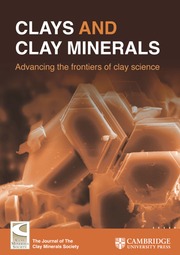Crossref Citations
This article has been cited by the following publications. This list is generated based on data provided by
Crossref.
Melnitchenko, Alexandra
Thompson, John G
Volzone, Cristina
and
Ortiga, José
2000.
Selective gas adsorption by metal exchanged amorphous kaolinite derivatives.
Applied Clay Science,
Vol. 17,
Issue. 1-2,
p.
35.
Venaruzzo, J.L
Volzone, C
Rueda, M.L
and
Ortiga, J
2002.
Modified bentonitic clay minerals as adsorbents of CO, CO2 and SO2 gases.
Microporous and Mesoporous Materials,
Vol. 56,
Issue. 1,
p.
73.
Volzone, C.
Rinaldi, J. O.
and
Ortiga, J.
2002.
N2 and CO2 Adsorption by TMA- and HDP-Montmorillonites.
Materials Research,
Vol. 5,
Issue. 4,
p.
475.
Jozefaciuk, Grzegorz
and
Bowanko, Grzegorz
2002.
Effect of Acid and Alkali Treatments on Surface Areas and Adsorption Energies of Selected Minerals.
Clays and Clay Minerals,
Vol. 50,
Issue. 6,
p.
771.
Churchman, G.J.
and
Volzone, C.
2003.
2001. A Clay Odyssey.
p.
31.
Volzone, C.
and
Ortiga, J.
2004.
Influence of the Exchangeable Cations of Montmorillonite on Gas Adsorptions.
Process Safety and Environmental Protection,
Vol. 82,
Issue. 2,
p.
170.
Volzone, C.
Masini, O.
Comelli, N.A.
Grzona, L.M.
Ponzi, E.N.
and
Ponzi, M.I.
2005.
α-Pinene conversion by modified-kaolinitic clay.
Materials Chemistry and Physics,
Vol. 93,
Issue. 2-3,
p.
296.
Metz, Volker
Raanan, Hadas
Pieper, Heike
Bosbach, Dirk
and
Ganor, Jiwchar
2005.
Towards the establishment of a reliable proxy for the reactive surface area of smectite.
Geochimica et Cosmochimica Acta,
Vol. 69,
Issue. 10,
p.
2581.
Bhattacharyya, Krishna G.
and
Sen Gupta, Susmita
2006.
Adsorption of Chromium(VI) from Water by Clays.
Industrial & Engineering Chemistry Research,
Vol. 45,
Issue. 21,
p.
7232.
Bhattacharyya, Krishna G.
and
Sen Gupta, Susmita
2006.
Pb(II) uptake by kaolinite and montmorillonite in aqueous medium: Influence of acid activation of the clays.
Colloids and Surfaces A: Physicochemical and Engineering Aspects,
Vol. 277,
Issue. 1-3,
p.
191.
Gupta, Susmita Sen
and
Bhattacharyya, Krishna G.
2006.
Adsorption of Ni(II) on clays.
Journal of Colloid and Interface Science,
Vol. 295,
Issue. 1,
p.
21.
Volzone, C.
Rinaldi, J.O.
and
Ortiga, J.
2006.
Retention of gases by hexadecyltrimethylammonium–montmorillonite clays.
Journal of Environmental Management,
Vol. 79,
Issue. 3,
p.
247.
Jozefaciuk, Grzegorz
and
Matyka-Sarzynska, Dorota
2006.
Effect of Acid Treatment and Alkali Treatment on Nanopore Properties of Selected Minerals.
Clays and Clay Minerals,
Vol. 54,
Issue. 2,
p.
220.
Bhattacharyya, Krishna G.
and
Gupta, Susmita Sen
2006.
Adsorption of Fe(III) from water by natural and acid activated clays: Studies on equilibrium isotherm, kinetics and thermodynamics of interactions.
Adsorption,
Vol. 12,
Issue. 3,
p.
185.
Bhattacharyya, Krishna G.
and
Gupta, Susmita Sen
2006.
Kaolinite, montmorillonite, and their modified derivatives as adsorbents for removal of Cu(II) from aqueous solution.
Separation and Purification Technology,
Vol. 50,
Issue. 3,
p.
388.
Tóth, Judit
and
Knapp, Erika
2007.
Sorption properties of light hydrocarbon-contaminated clay under defined conditions.
Central European Geology,
Vol. 50,
Issue. 1,
p.
79.
Valdrè, Giovanni
Malferrari, Daniele
Marchetti, Diego
and
Brigatti, Maria Franca
2007.
The effect of different plasma gas environments on vermiculite layer.
Applied Clay Science,
Vol. 35,
Issue. 1-2,
p.
76.
Bhattacharyya, Krishna G.
and
Sen Gupta, Susmita
2007.
Influence of Acid Activation of Kaolinite and Montmorillonite on Adsorptive Removal of Cd(II) from Water.
Industrial & Engineering Chemistry Research,
Vol. 46,
Issue. 11,
p.
3734.
Bhattacharyya, Krishna G.
and
Gupta, Susmita Sen
2007.
Adsorption of Co(II) from Aqueous Medium on Natural and Acid Activated Kaolinite and Montmorillonite.
Separation Science and Technology,
Vol. 42,
Issue. 15,
p.
3391.
Magaña, S.M.
Quintana, P.
Aguilar, D.H.
Toledo, J.A.
Ángeles-Chávez, C.
Cortés, M.A.
León, L.
Freile-Pelegrín, Y.
López, T.
and
Sánchez, R.M. Torres
2008.
Antibacterial activity of montmorillonites modified with silver.
Journal of Molecular Catalysis A: Chemical,
Vol. 281,
Issue. 1-2,
p.
192.


